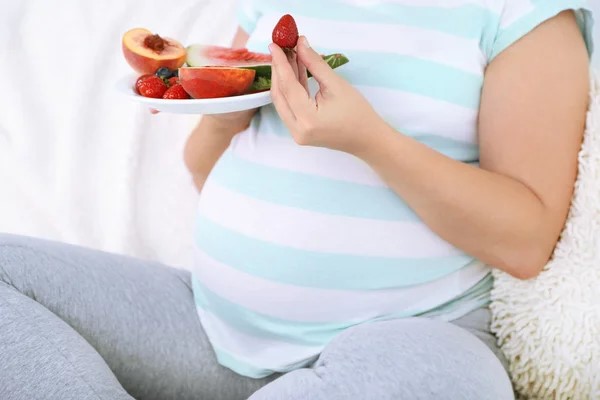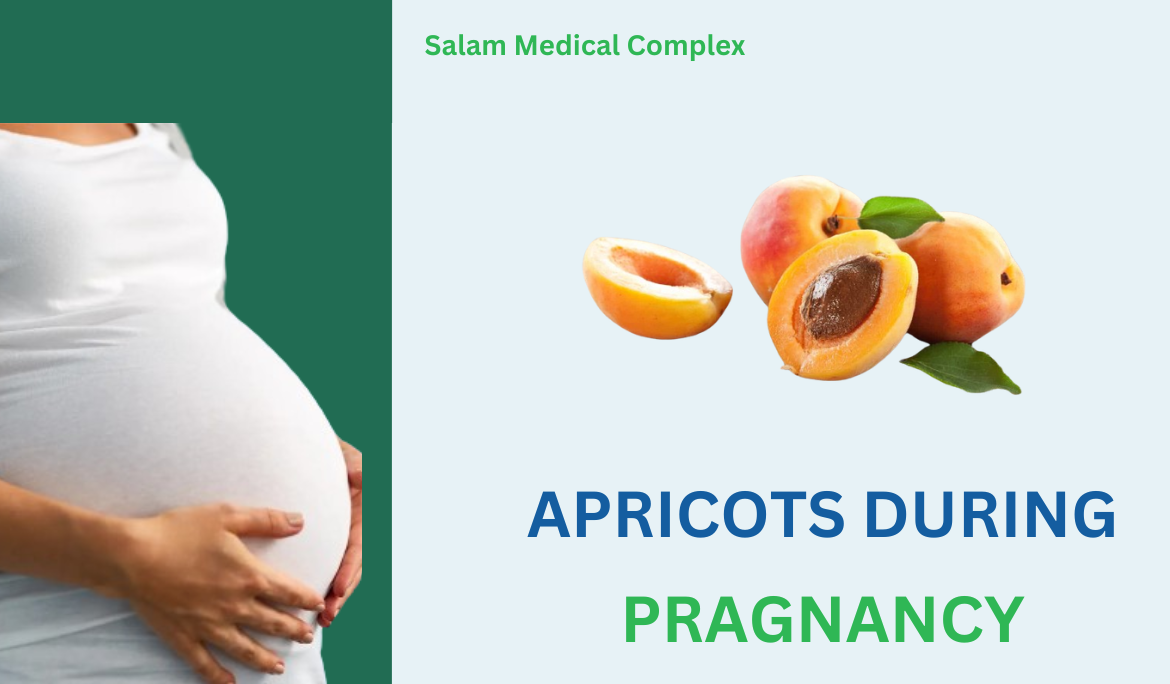Apricots During Pregnancy: What are the Risks and Benefits?
Are apricots safe during pregnancy, or do they pose hidden risks? In search of a balance between nutrition and precaution, expectant mothers often wonder this question. So, in this guide, we’ll discuss the nutritional advantages and risks of an apricot during pregnancy. Also, we’ll discover whether eating dry or regular apricots is beneficial, how much you can eat apricots during pregnancy and much more!
Is It Safe For Expectant Mothers To Eat Apricots?
Yes. Apricots boast high levels of vitamins A and C and potassium and iron, making them a nutritious choice during pregnancy. However, you must avoid the seeds of the fruit, as they contain a substance that can convert into cyanide, posing risks to both the mother and the unborn child.
While the edible portion of apricots may contain trace amounts of this substance, moderation is vital for healthy and safe consumption.
What Are the Health Benefits of Apricots in Pregnancy?
The following are some of the health benefits of eating an apricot during pregnancy:
1. Relief from Constipation
Apricots, rich in fiber, offer a natural solution to combat constipation and enhance digestion. Bid farewell to discomfort caused by symptoms like gas and bloating as apricots come to the rescue.
2. Treatment for Anaemia
Apricots are packed with iron and copper, which are valuable in boosting hemoglobin levels, effectively preventing anaemia during pregnancy.
3. Blood Sugar Regulation
Apricots play a role in maintaining optimal blood sugar levels, reducing the likelihood of gestational diabetes during pregnancy.
4. Supports Baby’s Development
Beyond benefiting mothers, apricots offer essential nutrients crucial for the growth and development of the baby. Moreover, the Folic acid in apricots helps prevent congenital disabilities like spina bifida.
The beta-carotene in dried apricots transforms into vitamin A, supporting the baby’s vision and immunity. Including apricots in your diet during pregnancy aids in this essential process. Moreover, dried apricots are high in calcium and promote the development of fetal bones.
5. Skin Benefits
Apricots work wonders for your skin, contributing to that desirable pregnancy glow when incorporated into your diet.
6. Promotes Lactation
Apricots, known for naturally enhancing breast milk production, are beneficial during the postpartum period.
7. Blood Pressure Management
With its potassium content, apricots assist in normalizing blood pressure, reducing the risks associated with high blood pressure during and after pregnancy. Also, it acts as a preventive measure against complications like preeclampsia.
8. Aids in Weight Management
With low calorie and fat content, apricots are ideal for weight-conscious pregnant women. The fiber in apricots promotes a sense of fullness, effectively curbing the tendency to overeat and supporting healthy weight management during pregnancy.
What Are the Risks of Eating Apricots in Pregnancy?
While maintaining a balanced diet is crucial during pregnancy, it’s equally important to maintain moderation in consuming all foods, including apricots. Despite the numerous health benefits apricots offer to pregnant women and their babies, there are potential risks to be aware of:
- Discomfort and Gastric Problems: Consuming unripe apricots during pregnancy may lead to discomfort and gastric issues in expectant mothers.
- Allergic Reactions: Apricots contain sulphur dioxide, which can trigger allergic reactions in women sensitive to sulphites. Those with sulphur sensitivity should exercise caution when including apricots in their diet.
- Amygdalin in Apricot Seeds: The seed of apricot contains amygdalin, a chemical that could potentially cause digestive upset. To maximize the benefits of the fruit while minimizing risks, consuming apricots after removing the tip is advisable.
Raw Apricot vs. Dried Apricot during Pregnancy: Which Is Suitable for Expectant Mothers?
Depending on individual taste and nutritional needs, apricots can be eaten raw or dried during pregnancy. Now let’s weigh the options:
Raw Apricots
Raw apricots provide a delightful crunch and a burst of flavor, being fresh and juicy. Moreover, with higher water content, they contribute to keeping the body hydrated.
Dried Apricots
Now you might be thinking, is dried apricot good for pregnancy? Here are some benefits of eating dried apricots during pregnancy:
- Dried apricots are high in potassium and effective in treating swelling during pregnancy.
- They are a good source of natural sugars, including fructose and glucose. Incorporating dried apricots into the pregnancy diet provides relief from a common discomfort experienced by expectant mothers.
- The dietary fiber in dried apricots helps treat constipation.
- Consuming dried apricots during pregnancy can assist in regulating and maintaining blood sugar levels.
So, both varieties offer distinct nutritional benefits, allowing you to make a choice that aligns with your needs during this crucial phase of pregnancy.
How Many Apricots Should I Eat In a Day During Pregnancy?

For expectant mothers, the general recommendation is to include 2-3 servings of fruit daily. A single serving, equivalent to four fresh apricots, positions the ideal daily intake between 8-12 fruits.
Nevertheless, it’s crucial to recognize that excessive consumption of a particular fruit may disrupt the nutrient balance. You should incorporate a variety of fruits into your diet and diversify your fruit choices.
What Is the Best Time to Enjoy Apricots During Pregnancy?
For pregnant individuals, the most favorable moments to include apricots in your diet are during breakfast or as a mid-morning snack. Introducing fruits in the morning can contribute to stabilizing blood sugar levels throughout the day, preventing undesirable snacking later on.
Top 6 Ways to Add Apricots to Your Pregnancy Nutrition

Incorporating apricots into your pregnancy diet is both effortless and delightful. Here are five beneficial ways to include apricots in your meals:
- Slice up fresh apricots and enhance your morning cereal with their natural sweetness.
- Blend fresh apricots with yogurt and honey to create a delicious and nutritious smoothie.
- Grill fresh apricots and serve them alongside a scoop of vanilla ice cream for a wholesome dessert.
- Add chopped dried apricots to your oatmeal or trail mix for a delightful and nutritious snack.
- Create a salad featuring fresh apricots, spinach, goat cheese, and pecans.
- Another delightful way to include apricots in your pregnancy diet is by preparing homemade apricot jam. Simply cook fresh apricots with sugar and lemon juice until they reach a soft, spreadable consistency.
Conclusion
Incorporating dried and regular apricots into a pregnancy diet can be a valuable addition to promoting overall well-being. These fruits offer a variety of essential nutrients that contribute to the health of the mother and the developing baby. From improving digestive health to supporting fetal development, apricots have numerous advantages. Nevertheless, it is crucial to consume them in moderation and seek guidance from your healthcare provider if you have specific concerns.
FAQs
Is It Safe To Eat Apricots During Pregnancy’s First Trimester?
Yes, eating apricots during the first trimester of pregnancy is safe. However, it is crucial to consume them in moderation.
Can Eating Apricots Assist In Weight Control During Pregnancy?
Yes, consuming fresh or raw apricots can benefit weight management during pregnancy due to their low-calorie content. However, dried apricot consumption can contribute to healthy weight gain.
Consult the best gynecologist in Lahore for expert opinion.


